高级英语书中涉及的修辞手法
- 格式:doc
- 大小:99.00 KB
- 文档页数:13
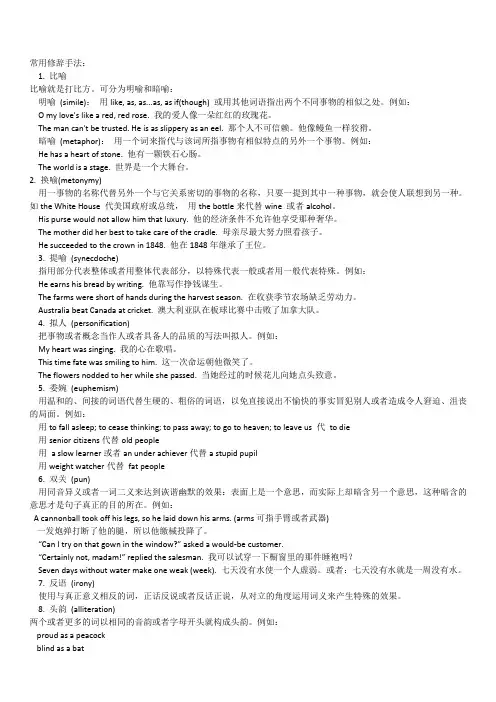
常用修辞手法:1. 比喻比喻就是打比方。
可分为明喻和暗喻:明喻(simile):用like, as, as...as, as if(though) 或用其他词语指出两个不同事物的相似之处。
例如:O my love's like a red, red rose. 我的爱人像一朵红红的玫瑰花。
The man can't be trusted. He is as slippery as an eel. 那个人不可信赖。
他像鳗鱼一样狡猾。
暗喻(metaphor):用一个词来指代与该词所指事物有相似特点的另外一个事物。
例如:He has a heart of stone. 他有一颗铁石心肠。
The world is a stage. 世界是一个大舞台。
2. 换喻(metonymy)用一事物的名称代替另外一个与它关系密切的事物的名称,只要一提到其中一种事物,就会使人联想到另一种。
如the White House 代美国政府或总统,用the bottle来代替wine 或者alcohol。
His purse would not allow him that luxury. 他的经济条件不允许他享受那种奢华。
The mother did her best to take care of the cradle. 母亲尽最大努力照看孩子。
He succeeded to the crown in 1848. 他在1848年继承了王位。
3. 提喻(synecdoche)指用部分代表整体或者用整体代表部分,以特殊代表一般或者用一般代表特殊。
例如:He earns his bread by writing. 他靠写作挣钱谋生。
The farms were short of hands during the harvest season. 在收获季节农场缺乏劳动力。
Australia beat Canada at cricket. 澳大利亚队在板球比赛中击败了加拿大队。

高级英语修辞总结HUA system office room 【HUA16H-TTMS2A-HUAS8Q8-HUAH1688】Rhetorical Devices一、明喻(simile)是以两种具有相同特征的事物和现象进行对比,表明本体和喻体之间的相似关系,两者都在对比中出现。
常用比喻词like, as, as if, as though等,例如:1、This elephant is like a snake as anybody can see.这头象和任何人见到的一样像一条蛇。
2、He looked as if he had just stepped out of my book of fairytales and had passed me like a spirit.他看上去好像刚从我的童话故事书中走出来,像幽灵一样从我身旁走过去。
3、It has long leaves that sway in the wind like slim fingers reaching to touch something.它那长长的叶子在风中摆动,好像伸出纤细的手指去触摸什么东西似的。
二、隐喻(metaphor)这种比喻不通过比喻词进行,而是直接将用事物当作乙事物来描写,甲乙两事物之间的联系和相似之处是暗含的。
1、German guns and German planes rained down bombs, shells and bullets...德国人的枪炮和飞机将炸弹、炮弹和子弹像暴雨一样倾泻下来。
2、The diamond department was the heart and center of the store.钻石部是商店的心脏和核心。
三、Allusion(暗引)其特点是不注明来源和出处,一般多引用人们熟知的关键词或词组,将其融合编织在作者的话语中。
引用的东西包括典故、谚语、成语、格言和俗语等。
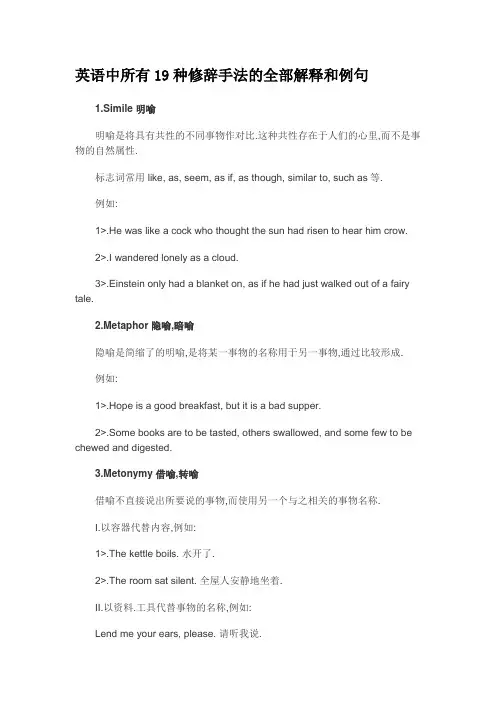
英语中所有19种修辞手法的全部解释和例句1.Simile 明喻明喻是将具有共性的不同事物作对比.这种共性存在于人们的心里,而不是事物的自然属性.标志词常用 like, as, seem, as if, as though, similar to, such as等.例如:1>.He was like a cock who thought the sun had risen to hear him crow.2>.I wandered lonely as a cloud.3>.Einstein only had a blanket on, as if he had just walked out of a fairy tale.2.Metaphor 隐喻,暗喻隐喻是简缩了的明喻,是将某一事物的名称用于另一事物,通过比较形成.例如:1>.Hope is a good breakfast, but it is a bad supper.2>.Some books are to be tasted, others swallowed, and some few to be chewed and digested.3.Metonymy 借喻,转喻借喻不直接说出所要说的事物,而使用另一个与之相关的事物名称.I.以容器代替内容,例如:1>.The kettle boils. 水开了.2>.The room sat silent. 全屋人安静地坐着.II.以资料.工具代替事物的名称,例如:Lend me your ears, please. 请听我说.III.以作者代替作品,例如:a complete Shakespeare 莎士比亚全集VI.以具体事物代替抽象概念,例如:I had the muscle, and they made money out of it. 我有力气,他们就用我的力气赚钱.4.Synecdoche 提喻提喻用部分代替全体,或用全体代替部分,或特殊代替一般.例如:1>.There are about 100 hands working in his factory.(部分代整体)他的厂里约有100名工人.2>.He is the Newton of this century.(特殊代一般)他是本世纪的牛顿.3>.The fox goes very well with your cap.(整体代部分)这狐皮围脖与你的帽子很相配.5.Synaesthesia 通感,联觉,移觉这种修辞法是以视.听.触.嗅.味等感觉直接描写事物.通感就是把不同感官的感觉沟通起来,借联想引起感觉转移,“以感觉写感觉”。
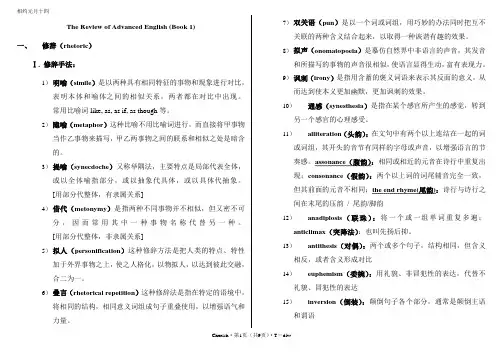
The Review of Advanced English (Book 1)一、修辞(rhetoric)Ⅰ. 修辞手法:1)明喻(simile)是以两种具有相同特征的事物和现象进行对比,表明本体和喻体之间的相似关系,两者都在对比中出现。
常用比喻词like, as, as if, as though等。
2)隐喻(metaphor)这种比喻不用比喻词进行,而直接将甲事物当作乙事物来描写,甲乙两事物之间的联系和相似之处是暗含的。
3)提喻(synecdoche)又称举隅法,主要特点是局部代表全体,或以全体喻指部分,或以抽象代具体,或以具体代抽象。
[用部分代整体,有隶属关系]4)借代(metonymy)是指两种不同事物并不相似,但又密不可分,因而常用其中一种事物名称代替另一种。
[用部分代整体,非隶属关系]5)拟人(personification)这种修辞方法是把人类的特点、特性加于外界事物之上,使之人格化,以物拟人,以达到彼此交融,合二为一。
6)叠言(rhetorical repetition)这种修辞法是指在特定的语境中,将相同的结构,相同意义词组成句子重叠使用,以增强语气和力量。
7)双关语(pun)是以一个词或词组,用巧妙的办法同时把互不关联的两种含义结合起来,以取得一种诙谐有趣的效果。
8)拟声(onomatopoeia)是摹仿自然界中非语言的声音,其发音和所描写的事物的声音很相似,使语言显得生动,富有表现力。
9)讽刺(irony)是指用含蓄的褒义词语来表示其反面的意义,从而达到使本义更加幽默,更加讽刺的效果。
10)通感(synesthesia)是指在某个感官所产生的感觉,转到另一个感官的心理感受。
11)alliteration(头韵):在文句中有两个以上连结在一起的词或词组,其开头的音节有同样的字母或声音,以增强语言的节奏感。
assonance(腹韵):相同或相近的元音在诗行中重复出现;consonance(假韵):两个以上词的词尾辅音完全一致,但其前面的元音不相同;the end rhyme(尾韵):诗行与诗行之间在末尾的压韵/ 尾韵/脚韵12)anadiplosis(联珠):将一个或一组单词重复多遍;anticlimax(突降法):也叫先扬后抑。
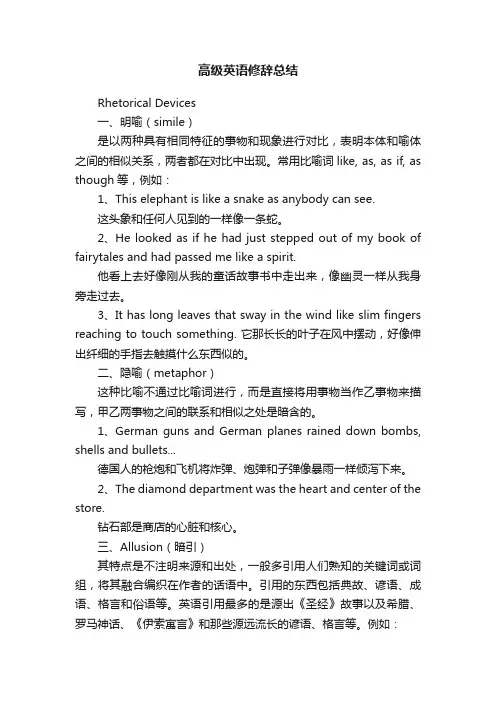
高级英语修辞总结Rhetorical Devices一、明喻(simile)是以两种具有相同特征的事物和现象进行对比,表明本体和喻体之间的相似关系,两者都在对比中出现。
常用比喻词like, as, as if, as though等,例如:1、This elephant is like a snake as anybody can see.这头象和任何人见到的一样像一条蛇。
2、He looked as if he had just stepped out of my book of fairytales and had passed me like a spirit.他看上去好像刚从我的童话故事书中走出来,像幽灵一样从我身旁走过去。
3、It has long leaves that sway in the wind like slim fingers reaching to touch something. 它那长长的叶子在风中摆动,好像伸出纤细的手指去触摸什么东西似的。
二、隐喻(metaphor)这种比喻不通过比喻词进行,而是直接将用事物当作乙事物来描写,甲乙两事物之间的联系和相似之处是暗含的。
1、German guns and German planes rained down bombs, shells and bullets...德国人的枪炮和飞机将炸弹、炮弹和子弹像暴雨一样倾泻下来。
2、The diamond department was the heart and center of the store.钻石部是商店的心脏和核心。
三、Allusion(暗引)其特点是不注明来源和出处,一般多引用人们熟知的关键词或词组,将其融合编织在作者的话语中。
引用的东西包括典故、谚语、成语、格言和俗语等。
英语引用最多的是源出《圣经》故事以及希腊、罗马神话、《伊索寓言》和那些源远流长的谚语、格言等。
例如:1、Grammar may be his heel of Achilles.语法是他的大弱点。
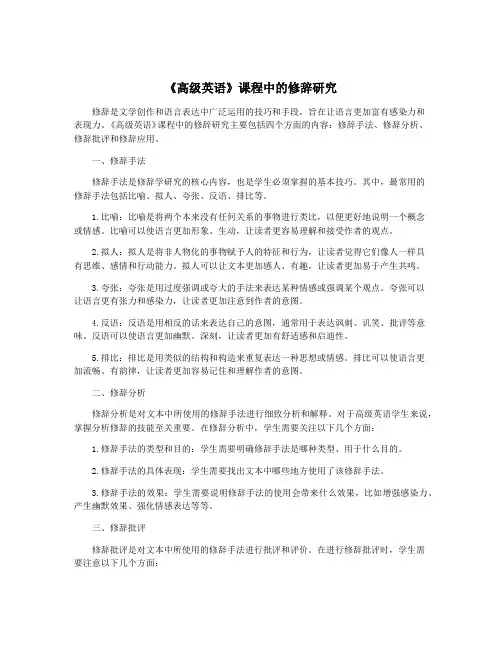
《高级英语》课程中的修辞研究修辞是文学创作和语言表达中广泛运用的技巧和手段,旨在让语言更加富有感染力和表现力。
《高级英语》课程中的修辞研究主要包括四个方面的内容:修辞手法、修辞分析、修辞批评和修辞应用。
一、修辞手法修辞手法是修辞学研究的核心内容,也是学生必须掌握的基本技巧。
其中,最常用的修辞手法包括比喻、拟人、夸张、反语、排比等。
1.比喻:比喻是将两个本来没有任何关系的事物进行类比,以便更好地说明一个概念或情感。
比喻可以使语言更加形象、生动,让读者更容易理解和接受作者的观点。
2.拟人:拟人是将非人物化的事物赋予人的特征和行为,让读者觉得它们像人一样具有思维、感情和行动能力。
拟人可以让文本更加感人、有趣,让读者更加易于产生共鸣。
3.夸张:夸张是用过度强调或夸大的手法来表达某种情感或强调某个观点。
夸张可以让语言更有张力和感染力,让读者更加注意到作者的意图。
4.反语:反语是用相反的话来表达自己的意图,通常用于表达讽刺、讥笑、批评等意味。
反语可以使语言更加幽默、深刻,让读者更加有舒适感和启迪性。
5.排比:排比是用类似的结构和构造来重复表达一种思想或情感。
排比可以使语言更加流畅、有韵律,让读者更加容易记住和理解作者的意图。
二、修辞分析修辞分析是对文本中所使用的修辞手法进行细致分析和解释。
对于高级英语学生来说,掌握分析修辞的技能至关重要。
在修辞分析中,学生需要关注以下几个方面:1.修辞手法的类型和目的:学生需要明确修辞手法是哪种类型、用于什么目的。
2.修辞手法的具体表现:学生需要找出文本中哪些地方使用了该修辞手法。
3.修辞手法的效果:学生需要说明修辞手法的使用会带来什么效果,比如增强感染力、产生幽默效果、强化情感表达等等。
三、修辞批评修辞批评是对文本中所使用的修辞手法进行批评和评价。
在进行修辞批评时,学生需要注意以下几个方面:1.修辞手法是否恰当:学生需要评估该修辞手法是否适合用于该文本的情境,是否符合文本的语气、风格和主题。
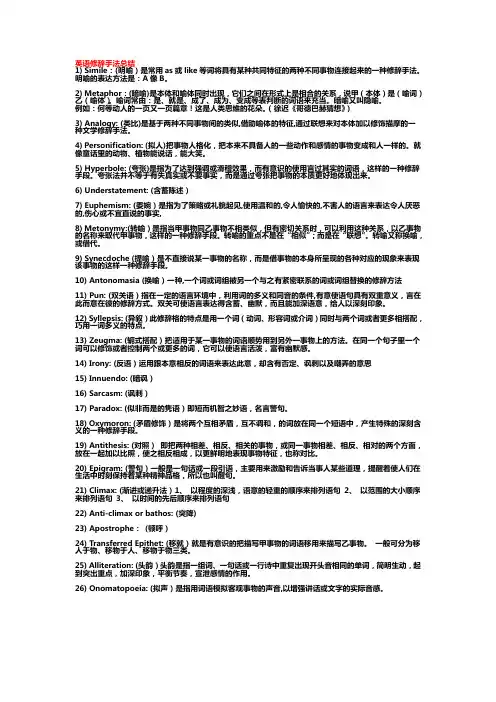
英语修辞手法总结1) Simile:(明喻)是常用as或like等词将具有某种共同特征的两种不同事物连接起来的一种修辞手法。
明喻的表达方法是:A像B。
2) Metaphor:(暗喻)是本体和喻体同时出现,它们之间在形式上是相合的关系,说甲(本体)是(喻词)乙(喻体)。
喻词常由:是、就是、成了、成为、变成等表判断的词语来充当。
暗喻又叫隐喻。
例如:何等动人的一页又一页篇章!这是人类思维的花朵。
(徐迟《哥德巴赫猜想》)3) Analogy: (类比)是基于两种不同事物间的类似,借助喻体的特征,通过联想来对本体加以修饰描摩的一种文学修辞手法。
4) Personification: (拟人)把事物人格化,把本来不具备人的一些动作和感情的事物变成和人一样的。
就像童话里的动物、植物能说话,能大笑。
5) Hyperbole: (夸张)是指为了达到强调或滑稽效果,而有意识的使用言过其实的词语,这样的一种修辞手段。
夸张法并不等于有失真实或不要事实,而是通过夸张把事物的本质更好地体现出来。
6) Understatement: (含蓄陈述)7) Euphemism: (委婉)是指为了策略或礼貌起见,使用温和的,令人愉快的,不害人的语言来表达令人厌恶的,伤心或不宜直说的事实,8) Metonymy:(转喻)是指当甲事物同乙事物不相类似,但有密切关系时,可以利用这种关系,以乙事物的名称来取代甲事物,这样的一种修辞手段。
转喻的重点不是在“相似”;而是在“联想”。
转喻又称换喻,或借代。
9) Synecdoche (提喻)是不直接说某一事物的名称,而是借事物的本身所呈现的各种对应的现象来表现该事物的这样一种修辞手段。
10) Antonomasia (换喻)一种,一个词或词组被另一个与之有紧密联系的词或词组替换的修辞方法11) Pun: (双关语)指在一定的语言环境中,利用词的多义和同音的条件,有意使语句具有双重意义,言在此而意在彼的修辞方式。
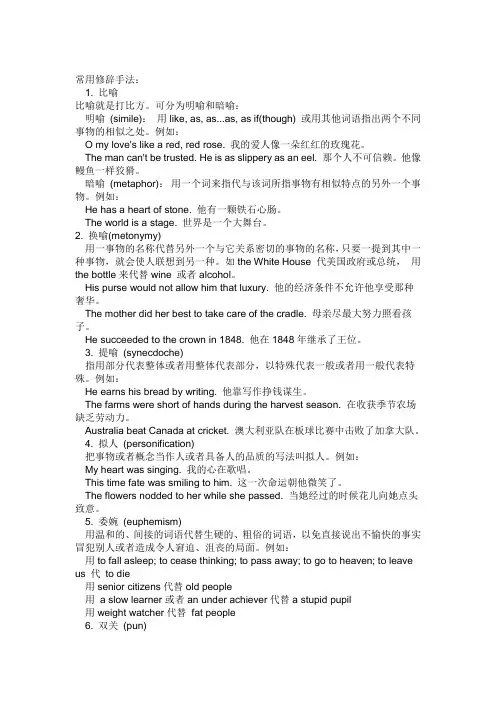
常用修辞手法:1. 比喻比喻就是打比方。
可分为明喻和暗喻:明喻(simile):用like, as, as...as, as if(though) 或用其他词语指出两个不同事物的相似之处。
例如:O my love's like a red, red rose. 我的爱人像一朵红红的玫瑰花。
The man can't be trusted. He is as slippery as an eel. 那个人不可信赖。
他像鳗鱼一样狡猾。
暗喻(metaphor):用一个词来指代与该词所指事物有相似特点的另外一个事物。
例如:He has a heart of stone. 他有一颗铁石心肠。
The world is a stage. 世界是一个大舞台。
2. 换喻(metonymy)用一事物的名称代替另外一个与它关系密切的事物的名称,只要一提到其中一种事物,就会使人联想到另一种。
如the White House 代美国政府或总统,用the bottle来代替wine 或者alcohol。
His purse would not allow him that luxury. 他的经济条件不允许他享受那种奢华。
The mother did her best to take care of the cradle. 母亲尽最大努力照看孩子。
He succeeded to the crown in 1848. 他在1848年继承了王位。
3. 提喻(synecdoche)指用部分代表整体或者用整体代表部分,以特殊代表一般或者用一般代表特殊。
例如:He earns his bread by writing. 他靠写作挣钱谋生。
The farms were short of hands during the harvest season. 在收获季节农场缺乏劳动力。
Australia beat Canada at cricket. 澳大利亚队在板球比赛中击败了加拿大队。

1、生动形象的Simile (明喻)英语辞格simile (明喻)是一种最简单、最常用的修辞方法,也是运用最为广泛的一种修辞手段。
在文学作品中尤其如此。
《文学词汇词典》(A Dictionary of Literary Terms)对明喻是这样定义的:A f igure of speech in which one thing is likened to another, in such a way as to clarify and enhance an image. It is explicit comparison (as opposed to the metaphor where comparison is implicit) recognizable by the use of words “like” or “as”.这个定义对明喻的界定既有权威性又有普遍性,许多论述英语修辞的书籍或文章在讲到明喻时,其叙述都没有超出这个概念。
根据定义,明喻是一种表现一事物像另一事物的修辞格。
说得通俗点,也就是打比方,即把要描述的事物——本体(A)用比喻词与另一种具有鲜明的同一特征的事物——喻体(B)联系起来。
常用的比喻词有 as(如), like(像), seem(似乎), as if (好像), as though(好像), such as(像……一样)等。
其基本格式是“A is like B”或“A is as…as B”。
Simile在英语中应用得很广泛,用以状物、写景、抒情、喻理,可收到生动形象,简单明了,新鲜有趣的修辞效果。
先看引自《大学英语·精读》(笔者按:系指董亚芬总主编的大学英语系列教材(College English)中的《精读(Intensiv e Reading 1-6册)》[修订本],上海外语教育出版社,1997。
下同)中的几个例子。
The cheque f luttered to the f loor like a bird with a broken wing. (Book 1, Unit 3)支票像只断了翅膀的小鸟似的飘落在地板上。
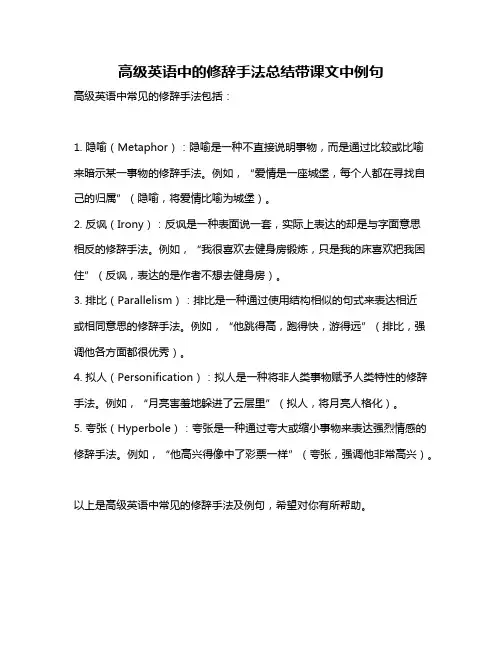
高级英语中的修辞手法总结带课文中例句
高级英语中常见的修辞手法包括:
1. 隐喻(Metaphor):隐喻是一种不直接说明事物,而是通过比较或比喻来暗示某一事物的修辞手法。
例如,“爱情是一座城堡,每个人都在寻找自己的归属”(隐喻,将爱情比喻为城堡)。
2. 反讽(Irony):反讽是一种表面说一套,实际上表达的却是与字面意思
相反的修辞手法。
例如,“我很喜欢去健身房锻炼,只是我的床喜欢把我困住”(反讽,表达的是作者不想去健身房)。
3. 排比(Parallelism):排比是一种通过使用结构相似的句式来表达相近
或相同意思的修辞手法。
例如,“他跳得高,跑得快,游得远”(排比,强调他各方面都很优秀)。
4. 拟人(Personification):拟人是一种将非人类事物赋予人类特性的修辞手法。
例如,“月亮害羞地躲进了云层里”(拟人,将月亮人格化)。
5. 夸张(Hyperbole):夸张是一种通过夸大或缩小事物来表达强烈情感的修辞手法。
例如,“他高兴得像中了彩票一样”(夸张,强调他非常高兴)。
以上是高级英语中常见的修辞手法及例句,希望对你有所帮助。
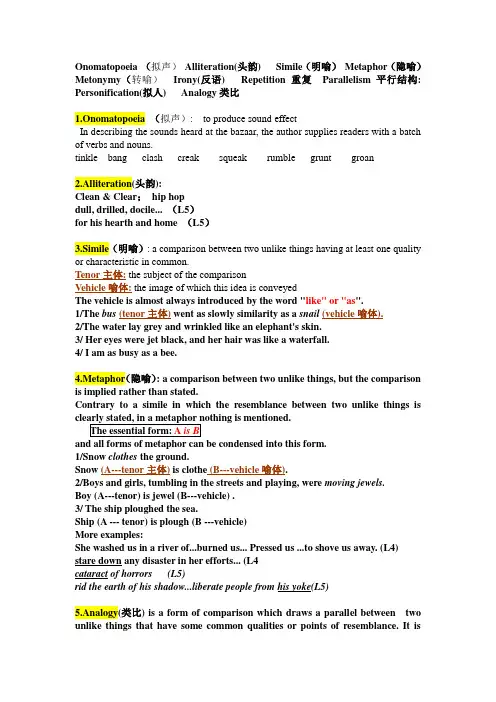
Onomatopoeia (拟声)Alliteration(头韵) Simile(明喻)Metaphor(隐喻)Metonymy(转喻)Irony(反语) Repetition重复Parallelism平行结构: Personification(拟人)Analogy类比1.Onomatopoeia (拟声): to produce sound effectIn describing the sounds heard at the bazaar, the author supplies readers with a batch of verbs and nouns.tinkle bang clash creak squeak rumble grunt groan2.Alliteration(头韵):Clean & Clear;hip hopdull, drilled, docile... (L5)for his hearth and home (L5)3.Simile(明喻): a comparison between two unlike things having at least one quality or characteristic in common.Tenor主体: the subject of the comparisonVehicle喻体: the image of which this idea is conveyedThe vehicle is almost always introduced by the word "like" or "as".1/The bus(tenor主体) went as slowly similarity as a snail(vehicle喻体).2/The water lay grey and wrinkled like an elephant's skin.3/ Her eyes were jet black, and her hair was like a waterfall.4/ I am as busy as a bee.4.Metaphor(隐喻): a comparison between two unlike things, but the comparison is implied rather than stated.Contrary to a simile in which the resemblance between two unlike things is1/Snow clothes the ground.Snow (A---tenor主体) is clothe (B---vehicle喻体).2/Boys and girls, tumbling in the streets and playing, were moving jewels.Boy (A---tenor) is jewel (B---vehicle) .3/ The ship ploughed the sea.Ship (A --- tenor) is plough (B ---vehicle)More examples:She washed us in a river of...burned us... Pressed us ...to shove us away. (L4) stare down any disaster in her efforts... (L4cataract of horrors (L5)rid the earth of his shadow...liberate people from his yoke(L5)5.Analogy(类比) is a form of comparison which draws a parallel between two unlike things that have some common qualities or points of resemblance. It ischiefly used for the purpose of persuasion or for the explanation of an idea or working concept. It is especially helpful in explaining abstract ideas.1/ Just as men are killing such large number of elephants for their tusks that they will soon extinguish, we are using and destroying resources in such a big amount that we are disturbing the balance between daylight and darkness. (L3)6.Metonymy(转喻)is a figure of speech that has to do with the substitution of the name of one thing for that of another. In other words, it involves a “change of name,”the substituted name suggesting the thing meant.Metonymy can be derived from various sources—from names of persons, from animals, professions, locations, place names, etc.Names of personsHave you ever read Mark Twain?John Bull—Britain, or the British peopleUncle Sam—U.S.A.Ivan—the Russian peopleAnimalsThe British Lion—The Polar Bear—ProfessionsThe press—newspapers; journalistsThe bar—the legal professionLocations of government, headquarters, etc.Capitol Hill—legislative branch of US GovernmentThe Pentagon—US military establishmentKremlin—Russian GovernmentWall Street—Hollywood—OthersThe pen—the crown—7.Repetition重复:A/ Repetition of the same word or structure:1/We have but one aim and one single purpose2/ Nothing will turn us---nothing3/ We will never parley, we will never negotiate...4/ This is our policy and this is our declarationB/ Repetition of the same meaning with different words:1/as we shall faithfully and steadfastly2/ We have but one aim, one single irrevocable purpose.8.Parallelism平行结构:1/ The past, with its crimes, its follies, and its tragedies.2/ the return of the bread-winner, of their champion, of their protector3/I see,...I see...I see…4/ We shall fight him by land, we shall fight him by sea, we shall fight him in the air 9..Personification(拟人) is a figure of speech that gives human form or feelings to animals or life and personal attributes to inanimate objects or to ideas and abstractions.A/ use pronounsThe ship (she) the dog (he)B/ other waysNature, land—mother nature; motherland1/ Youth is hot and bold. Age is weak and cold.Youth is wild and age is tame. (by Shakespeare)10.Irony(反语) is a figure of speech that achieves emphasis by saying the opposite of what is meant, the intended meaning of the words being the opposite of their usual senses.Eg.1/Fatty for a thin boy/girl; skinny for someone very fat2/ “I love queuing up.” ( I actually hate it.)。
⾼级英语⼀修辞格归纳《⾼级英语(⼀)》修辞格归纳英语修辞格种类1.⾳韵修辞格(phonological rhetorical devices)⾳韵修辞格是利⽤词语的语⾳特点创造出来的修辞⼿法。
主要包括onomatopoeia、alliteration、assonance(元韵)、consonance(辅韵)等。
2.词义修辞格(semantic rhetorical devices)主要借助语义的联想和语⾔的变化等特点创造出来的修辞⼿法。
主要包括simile, metaphor, allusion(典故), metonymy, transferred epithet, personification, hyperbole, irony, euphemism, pun, oxymoron, zeugma(轭式修饰法), contrast 等。
3.句法修辞格(syntactical rhetorical devices)主要是指通过句⼦结构的均衡布局或是突出重点创造出来的修辞⼿法。
这类辞格主要包括repetition, rhetorical question, parallelism, antithesis, apostrophe (顿呼)等。
Anti-climax 渐降、突降法It is the opposite of Climax (渐升、层进法). A climbing down from strong to weak, from most impressive to less impressive. It is often used in humorous writing.1.For God, for American, and for Yale.2.The duties of a solider are to protect his country and peel potatoes.3.O dear!What shall I do?I have lost my beau and lipstick too.4.I love my motherland,I love my people,I love my wife and my son and my daughter,I also love my pretty little dog.幽默风趣讽刺嘲笑出⼈意料Climax 渐升、层进法A figure of speech in which a series of words or ideas is arranged in order of increasing importance.1.We’re low---we’re very low---we’re very very low, as low as low can be.2.The audience smiled, chuckled and finally howled.3.Some books are to be tasted, others to be swallowed, and some few to be chewed anddigested.4.He who loses wealth loses much; he who loses a friend loses more; but he who loses courageloses all.5.The drunkard smashed the glasses, upturned the table, and hit an old woman.Rhetorical Question 修辞问句Asking a question whose answer is self-evident intended to stir emotions.A question requiring no answer.不需要回答,其答案寓于问句的反⾯, 其作⽤是加强语⽓,表达强烈的感情, 以引起读者或听者深思。
高级英语2第十课修辞总结摘要:一、引言二、高级英语2 第十课修辞学概述1.比喻2.拟人3.夸张4.反问三、修辞手法在实际英语写作中的应用1.比喻1.明喻2.隐喻2.拟人3.夸张4.反问四、修辞手法在提高英语写作效果的作用五、结论正文:【引言】高级英语2 第十课主要介绍了修辞学中的几种重要手法,包括比喻、拟人、夸张和反问。
这些修辞手法在英语写作中有着广泛的应用,能够有效地提高文章的表达效果和吸引力。
【高级英语2 第十课修辞学概述】修辞学是语言学的一个分支,主要研究如何运用各种语言手段来增强语言表达的效果。
在第十课中,我们主要学习了以下四种修辞手法:1.比喻:通过将两种本质上不同的事物进行类比,以形象生动的方式表达抽象的概念。
比喻可以分为明喻和隐喻两种。
2.拟人:将无生命的事物赋予生命和人的特征,使其具有感情、动作等。
3.夸张:对某一事物的特点进行夸大描述,以突出表现其特性。
4.反问:提出一个问题,但实际上并不需要对方回答,其目的是为了加强语气,表达说话者的观点。
【修辞手法在实际英语写作中的应用】在英语写作中,我们可以灵活运用这些修辞手法来提高文章的表达效果。
以下是一些实例:1.比喻:例如,“时间是金钱”,通过将时间和金钱进行类比,形象地表达了时间的宝贵。
2.拟人:例如,“月亮羞涩地躲在云朵后面”,将月亮赋予了人的情感和动作。
3.夸张:例如,“他饿得能吃下一头牛”,夸张地描述了他的饥饿程度。
4.反问:例如,“这难道不是一件很明显的事情吗?”通过反问加强语气,表达说话者的观点。
【修辞手法在提高英语写作效果的作用】修辞手法的运用可以使文章更加生动、有趣,增强读者的阅读兴趣。
同时,修辞手法还能够有效地传达作者的情感和观点,使文章更具说服力。
因此,学习和掌握修辞手法对于提高英语写作水平具有重要意义。
【结论】总之,高级英语2 第十课为我们介绍了四种重要的修辞手法:比喻、拟人、夸张和反问。
在英语写作中,我们可以灵活运用这些修辞手法来提高文章的表达效果和吸引力。
高级英语修辞手法总结归纳修辞是语言使用中的重要技巧,通过巧妙运用各种修辞手法,能使语言表达更为生动、有力或富有韵味。
以下是对常见的高级英语修辞手法的总结归纳:一、隐喻与明喻隐喻是将一个词或短语用来暗示另一个事物,而明喻则是直接将一个事物与另一个事物进行比较。
例如,“他像一只狮子一样勇猛”(明喻)和“爱情是一座城堡”(隐喻)。
二、拟人及拟物拟人是赋予非生物或抽象事物以人的特性,而拟物则是赋予人或动物以非生物的特性。
例如,“河流唱着轻快的歌曲”(拟人)和“他的怒火如野兽般狂暴”(拟物)。
三、排比与对偶排比是将三个或以上结构相似、意义相近的词、短语或句子并列使用,以增强语势。
对偶则是将意义相对或相反的词、短语或句子进行对比,以突出主题。
例如,“生命在于运动,死亡在于静止”(对偶)和“他跨越了山岭,穿越了沙漠,走过了平原”(排比)。
四、反复与交错反复是将相同的词、短语或句子重复使用,以强调某种情感或主题。
交错则是将不同的词、短语或句子相互交替使用,以达到特定的表达效果。
例如,“永远、永远、永远不要放弃”(反复)和“是与否,对与错”(交错)。
五、借代与提喻借代是用一个事物的某一部分来代替整体或其他部分,而提喻则是用整体来代替某一部分或用类属来代替个体。
例如,“我要用笔墨写下永恒”(借代)和“人是一本书”(提喻)。
六、反讽与戏谑反讽是通过说反话或正话反说来达到讽刺的效果,戏谑则是用幽默诙谐的语言来戏弄或嘲笑某人或某事。
例如,“他是一个天生的傻瓜”(反讽)和“爱情是人生的蜜糖”(戏谑)。
七、矛盾修辞法矛盾修辞法是将相互矛盾的概念或形象结合在一起,以引起读者的思考或表达复杂的情感。
例如,“孤独的狂欢”,“死亡的生命”。
八、头韵与脚韵头韵是使用相同或相似的音韵开头,脚韵是使用相同或相似的音韵结尾。
例如,“美丽的美女”(头韵)和“生活是一首歌”(脚韵)。
九、夸张与弱化夸张是通过夸大事实或形象来强调某种情感或主题,弱化则是通过缩小事实或形象来淡化某种情感或主题。
高级英语第三版本册1-7课修辞整理
修辞(Rhetoric)是指修词造句的艺术,旨在使文章表达更加
生动、准确。
在英语写作中,修辞手法的运用可以为文本增添色彩
并强化文章逻辑。
以下是本文对高级英语第三版本册1-7课修辞手
法的整理:
1. 比喻(Metaphor):通过将两种不同的事物进行比较来强化
表达。
例:“你是我的太阳”(You are my sunshine)。
2. 拟人(Personification):将非人事物拟人化,使其表现出人
类的特性。
例:“阳光明媚”(The sunshine smiled upon us)。
3. 讽刺(Irony):用反语强调与实际相反的意思。
例:“我今
天看起来真好看,唯一的问题是我感冒了”(I look amazing today. The only problem is that I have a cold.)。
6. 借代(Metonymy):用一个相关的单词或短语来替代原文,起到简洁的效果。
例:“冠军”(champion)代表整个团队获胜。
7. 倍受争议的说法(Euphemism):用含蓄、委婉和微妙的词语或说法来表达直接或难以接受的事情。
例:“真是一个有趣的人”(He is quite a character)。
以上是高级英语第三版本册1-7课修辞手法整理,希望对大家的英语写作有所帮助。
高级英语1修辞手法汇总修辞手法是英语写作中常用的一种技巧,通过运用修辞手法可以使文章更加生动、富有表现力,增强读者的阅读体验。
在高级英语写作中,修辞手法的运用尤为重要,它可以为文章赋予深度和风格,并提升文章的艺术性和说服力。
下面将介绍几种常见的修辞手法。
一、比喻(Metaphor)比喻是一种通过将一个事物与另一个事物相比较,以便更好地说明或形容某个概念或主题的修辞手法。
它常常用于描述抽象的概念,使之变得更加具体和形象。
例句:1. He is a lion in the battlefield.2. Her smile was a ray of sunshine on a cloudy day.二、拟人(Personification)拟人是一种将非人类的事物或抽象的概念赋予人类的特征和行为的修辞手法。
通过将这些非人类的事物拟人化,可以使文章更生动有趣,增强读者对其中事物的感知和理解。
例句:1. The wind whispered through the trees.2. The flowers danced in the breeze.三、夸张(Hyperbole)夸张是一种通过夸大事物的特征或情况来强调其重要性或影响力的修辞手法。
它常用于诗歌、演讲或幽默作品中,以引起读者的兴趣和共鸣。
例句:1. I've told you a million times not to do that!2. The line for the new iPhone was a mile long.四、反问(Rhetorical question)反问是一种不需要回答的问题,用于引起读者的思考或表达某种意义的修辞手法。
通过将一个问题直接提出,可以引起读者的兴趣和注意,并激发其对文章主题的思考。
例句:1. Do you really think I would believe such a ridiculous story?2. Can you imagine a world without music?五、排比(Parallelism)排比是一种通过重复并列的结构或类似的语法结构来增加修辞效果的修辞手法。
英语修辞手法1、Simile明喻明喻就是将具有共性得不同事物作对比、这种共性存在于人们得心里,而不就是事物得自然属性.标志词常用like, as, seem, as if, as though, similar to, such as 等。
例如:1>。
He waslike acock who thoughtthe sunhad risento hear him crow、2>、I wanderedlonely asa cloud。
3>。
Einstein only had a blanketon, as ifhe had just walkedou tofafairy tale、2。
Metaphor 隐喻,暗喻隐喻就是简缩了得明喻,就是将某一事物得名称用于另一事物,通过比较形成。
例如:1〉。
Hope isa good breakfast, but itis a badsupper、2>.Some books are to be tasted, othersswallowed, andsome few to bechewed and digested。
3、Metonymy借喻,转喻借喻不直接说出所要说得事物,而使用另一个与之相关得事物名称、I。
以容器代替内容,例如:1>。
The kettleboils、水开了、2〉。
Theroom sat silent、全屋人安静地坐着。
II。
以资料、工具代替事物得名称,例如:Lend me your ears, please.请听我说、III.以作者代替作品,例如:a plete Shakespeare 莎士比亚全集VI、以具体事物代替抽象概念,例如:Ihadthe muscle, andthey made money out of it、我有力气,她们就用我得力气赚钱。
4、Synecdoche 提喻提喻用部分代替全体,或用全体代替部分,或特殊代替一般、例如:1>。
Lecture Preparation for Figures of SpeechI. Sound Effecta. onomatopoeiaDef. the use of words whose pronunciation imitates the sound the word describes. "Buzz," for example, when spoken is intended to resemble the sound of a flying insect. Other examples include these: slam, pow, screech, whirr, crush, sizzle, crunch, wring, wrench, gouge, grind, mangle, bang, blam, pow, zap, fizz, urp, roar, growl, blip, click, whimper, and, of course, snap, crackle, and pop. Note that the connection between sound and pronunciation is sometimes rather a product of imagination ("slam" and "wring" are not very good imitations). And note also that written language retains an aural quality, so that even unspoken your writing has a sound to it.b. alliterationDef. repetition of the same sound beginning several words in sequence1. "Somewhere at this very moment a child is being born in America. Let it beour cause to give that child a happy home, a healthy family, and a hopeful future."2. "And our nation itself is testimony to the love our veterans have had forit and for us. All for which America stands is safe today because bravemen and women have been ready to face the fire at freedom's front."c. assonanceDef. repetition of the same sound in words close to each otherA bird is subject to decay and dereliction until all the energy is released.Once upon a midnight dreary, while I pondered , weak and weary,…..I could felt and smelt the river emptied itself into the gorge.There is an element of word magic here: entomology and limnology sound more important than merely insect biology and fresh water biology.A deep green streamI arise from the dream of thee.fleet feet sweep by sleeping geeks.'The rain in Spain falls mainly on the plain.''We love to spoon 'neath the moon in June.'On either side the river lieLong fields of barley and of ryed. consonanceDef.John swelled and ruffled his plumageII. Comparisona. simileDef. the anticipation, in adjectives or nouns, of the result of the action of a verb; also, the positioning of a relative clause before its antecedent1. A is like B.The check fluttered to the floor like a bird with a broken wing. Praise is like sunlight to the human spirit we cannot flower and grow without it.2.As …. as,as blind as a bat, as cool as a cucumber, as busy as bee, as firm as a rock,3.as ifMy handwriting looks as if a swarm of ants, escaping from an inkbottle, had walked over a sheet of paper without wiping their logs.… and the fattest man I have ever seen i n my life dozing in a straight-backed chair. It was as if a sack of grain was supported by a matchbox.4. A is to B is what X to YThe pen is to a writer is what the gun to a fighter.What salt is to food, that wit and humor are to conversation and literature?5.thanA fool can no more see his own folly than he can see his ears.We have no more right to consume happiness without producing it than to consume wealth without producing it.6.andA word and a stone let go cannot be recalled.Words and feather are tossed by the wind.Truth and roses have thorns about them.7.verbs (treat, regard, consider, serve, respect, …).. as)I compare genius to a lightning flash.Samuel Johnson regarded dictionaries as a watch.He treats his daughter as the eye of the apple.8.resemble…. It should fall with a gentle rustle, resembling that of a mouse, between shutter and glass.b. metaphorDef. implied comparison achieved through a figurative use of words; the word is used not in its literal sense, but in one analogous to it.e.g.1.to beOut, out, brief candle, life is but a walking shadow.Money is bottomless sea, in which honor, conscience and truth may be drowned.2.n of nI fall upon the thorns of life.3.verbs or adjectivesI a nticipated my case would snowballed into one of the most famous trials inU>S> history.Her hostility melted.Those people would ape anything that is new and foreign.I have got a Sahara thirst on tonight.By this hour the volcanic fire of his nature had burnt down,The tree of liberty must be refreshed from time to time with the blood of patriotsand tyrants. It is the natural manure.It is the same with Negro in Africa. That shoe….. The white man’s system …. Ahs pinched and rubbed and squeezed his soul until it has almost destroyed him.Do you like talking to people who smile at you coldly and give you sharp replies? Or do you prefer people who greet you warmly and are sweet with you? What kind of strong things do you values: strong relationships, strong government, strong tastes? What kind of soft things do you appreciate: soft pillows, soft colors, soft voices? Deep people intrigue us and provoke admiration, while deep grief is sometimes too much to bear. Bright light may be blinding, but bright music sets us into a cheerful mood, and bright children with bright eyes are a delight to every parent. Connoisseurs may have a penchant for dry wine, but people with a dry sense of humor often put off their collocutors…….Extended metaphorGoing back to Hemingway’s work after several years is like going to a brook where you had often fished and finding the woods as deep and cool as they used to be. The trees are bigger, perhaps, but they are the same trees; the water comes down over the black stones as clear as always, with the same dull, steady roar where it plunges into the pool; and when the first trout takes hold of your line you can feel your heart beating against your fishing jacket. But something has changed, for this you have a sense that this time there are shadows in the pool that you had not noticed, and you have a sense that the woods are haunted.c. personificationDef. attribution of personality to an impersonal thing1. The long drawn booming of the wind in the wood and the s obbing and moaning in the maples and oaks near the house, had made Lettie restless.2. The long flames sang their drumming chorus in voices of the heaviest bass.The brook hurried along s inging, only here and there lingering to whisper to the secret bushes, then setting off afresh with a new snatch of song.The stones of the large house were burdened with ivy and honeysuckle, and the great lilac bush that had once guarded the porch now almost blocked the way.The white town drowsing in the sunshine of a summer’s morning;A horse meditating in the shade of one of the hickories lazily swished his tail.d. metonymyDef. is another form of metaphor, very similar to synecdoche (and, in fact, some rhetoricians do not distinguish between the two), in which the thing chosen for the metaphorical image is closely associated with (but not an actual part of) the subject with which it is to be comparedThe baby was brought up on the bottle."A dish" for an entree."The press" for the news media."Wall Street" for the American financial industry."Hollywood" for the American film industry."Washington" for the American federal government."The Crown" for the British monarchy."The pen is mightier than the sword"; pen is a metonym for rhetoricalpersuasion and sword is a metonym for violent coercion.The students read Emerson, Torean, and Huxley.The kettle is boiling.He is not the man who lets his heart lead his head.The pen is mightier than the sword.Gray hair should be respected.He is too fond of bottle.I have never read Faulkner.sleepless nightThe burglar was in Sally's mind all day longShe pushed the burglar to one side of her mind.e. synecdocheDef. a type of metaphor in which the part stands for the whole, the whole for a part, the genus for the species, the species for the genus, the material for the thing made, or in short, any portion, section, or main quality for the whole or the thing itself (or vice versa)A part of something is used for the whole"hands" to refer to workers,"head" for cattle,"threads" for clothing,"wheels" for car,"mouths to feed" for hungry people,"white hair" for the elderly,"The Press" for news mediaThe whole is used for a part"the police" for a handful of officers,"body" for the trunk of the body,the "smiling year" for spring,"the Pentagon" for the top-ranking generals in the Pentagon buildingThe species is used for the genus"cutthroat" for assassin,"kleenex" for facial tissue,"coke" for soda,"castle" for home,"bread" for foodThe genus is used for the species"creature" for person,"milk" for cow's milk"willow" for cricket bat,"copper" for penny,"boards" for stage,"ivories" for piano keys,"plastic" for credit card,"the hardwood" for a gym floorIII. structurea. parallelDef. recurrent syntactical similarity. Several parts of a sentence or several sentences are expressed similarly to show that the ideas in the parts or sentences are equal in importance. Parallelism also adds balance and rhythm and, most importantly, clarity to the sentence.Any sentence elements can be paralleled, any number of times (though, of course, excess quickly becomes ridiculous).parallel subjects with parallel modifiers attached to them:∙Ferocious dragons breathing fire and wicked sorcerers casting their spells do their harm by night in the forest of Darkness.parallel verbs and adverbs:∙I have always sought but seldom obtained a parking space near the door.∙Quickly and happily he walked around the corner to buy the book.Or parallel verbs and direct objects:∙He liked to eat watermelon and to avoid grapefruit.Or just the objects:∙This wealthy car collector owns three pastel Cadillacs, two gold Rolls Royces, and ten assorted Mercedes.Or parallel prepositional phrases:∙He found it difficult to vote for an ideal truth but against his own self interest.∙The pilot walked down the aisle, through the door, and into the cockpit, singing "Up, Up, and Away."parallel participial, infinitive, and gerund phrases:∙He left the engine on, idling erratically and heating rapidly.∙To think accurately and to write precisely are interrelated goals.∙She liked sneaking up to Ted and putting the ice cream down his back, because he was so cool about it.Here are some other examples of parallelism:∙I shall never envy the honors which wit and learning obtain in any other cause, if I can be numbered among the writers who have given ardor to virtue, andconfidence to truth. --Samuel Johnson∙They had great skill in optics, and had instructed him to see faults in others, and beauties in himself, that could be discovered by nobody else. . . .--Alexander Pope∙For the end of a theoretical science is truth, but the end of a practical science is performance. --Aristotleb. antithesisDef. opposition, or contrast of ideas or words in a balanced or parallel construction Extremism in defense of liberty is no vice, moderation in the pursuit of justice is no virtue. Barry Goldwater*Brutus: Not that I loved Caesar less, but that I loved Rome more. Shakespeare, Julius Caesar*The vases of the classical period are but the reflection of classical beauty; the vases of the archaic period are beauty itself." Sir John Beazley"It was the best of times, it was the worst of times, it was the age of wisdom, it was the age of foolishness, it was the epoch of belief, it was the epoch of incredulity, it was the season of Light, it was the season of Darkness, it was the spring of hope, it was the winter of despair, we had everything before us, we had nothing before us, we were all going direct to Heaven, we were all going direct the other way.""I would rather be ashes than dust! I would rather that my spark should burn out in a brilliant blaze than it should be stifled by dryrot. I would rather be a superb meteor, every atom of me in magnificent glow, than a sleepy and permanent planet. The proper function of man is to live, not to exist. I shall not waste my days in trying to prolong them. I shall use my time."c. climaxDef. arrangement of words, phrases, or clauses in an order of ascending power. Often the last emphatic word in one phrase or clause is repeated as the first emphatic word of the next..Let a man acknowledge his obligations to himself, his family, his country, and his God."Why should white people be running all the stores in our community? Why should white people be running the banks of our community? Why should the economy of our community be in the hands of the white man? Why?d. anticlimaxDef. sequence of ideas that abruptly diminish in dignity or importance at the end of a sentence or passage, generally for satirical effectAmong the great achievements of Benito Mussolini's regime were the revival of a strong national consciousness, the expansion of the Italian Empire, and the running of the trains on time.IV. meaninga. zeugmaDef. includes several similar rhetorical devices, all involving a grammatically correct linkage (or yoking together) of two or more parts of speech by another part of speech. Thus examples of zeugmatic usage would include one subject with two (or more) verbs, a verb with two (or more) direct objects, two (or more) subjects with one verb, and so forth. The main benefit of the linking is that it shows relationships between ideas and actions more clearlyShe was dressed in a maiden’s cap, a pinafore, and a bright smile.Glass, china and reputation are easily cracked and never well mended.I used to organize my father’s tools, my mother’s kitchen utensils , and my sister’s boyfriends.∙She lowered her standards by raising her glass,Her courage, her eyes and his hopes.You held your breath and the door for me.I took her hand and then an aspirin in the morning,The Russian grandees came to Elizabeth's court dropping pearls and vermin.Are you getting fit or having one?You are free to execute your laws, and your citizens, as you see fitShe was a thief, you got to believe: she stole my heart and my cat.∙Here Thou, great Anna! whom three Realms obey,Dost sometimes Counsel take - and sometimes Tea.∙"Loud lightning and thunder shook the temple walls."∙"The sky—and my hopes—is falling."∙"Our son's diaper—and your excuses—is stinking."∙She] went straight home in a flood of tears, and a sedan chair. - Charles Dickens∙∙My teeth and ambitions are bared; be prepared! - Scar, from The Lion King with lyrics by Tim Rice∙The levees were broken and so were the promises. - Anderson Cooper, Dispatches from the Edge∙By the time we left the bar, I'd bought her story, as well as her three drinks.The kleptomaniac illusionist stole the show and my wallet.∙He drowned his sorrows and his cat, but the relief was only temporary; it was only a matter of time before it took a more sophisticated victim to quell hisdisturbances.∙It certainly wouldn't break anyone's heart or bank to give some time to charity.∙The farmers in the valley grew potatoes, peanuts, and bored.∙The bored suicide decided to kill time and himself.∙She opened the door and her heart to the orphan.The addict kicked the habit and then the bucket.∙to wage war and peaceHe lost his coat and his temper.b. hyperboleDef. exaggeration for emphasis or for rhetorical effectc. understatementd. ironye. oxymoronDef. apparent paradox achieved by the juxtaposition of words which seem to contradict one another.open secretlarger halfclearly confusedact naturallyalone togetherHell's Angelsfound missingliquid gascivil engineerdeafening silenceseriously funnyliving deadMicrosoft Worksmilitary intelligencejumbo shrimpAdvanced BASICtragic comedyunbiased opinionvirtual realitydefinite maybeoriginal copiespretty uglysame differenceplastic glassesalmost exactlyconstant variableeven oddsminor crisisextinct lifegenuine imitationexact estimateonly choicefreezer burnfree loveworking holidayrolling stopf. transferred epithetDef. an adjective modifying a noun which it does not normally modify, but which makes figurative senseOur teacher writes that instead of drowning the students’ compositions in critical red ink,The indefatigable bell now sounded for the fourth time: the classes were marshaled and marched into another room to breakfast:All that sleepless nightShe has expensive tastes for clothes.He behaved with a guilty caution and rather enjoyed stealing a march on Doctor Ed.Painful wordsEarly gravesSmiling wordsElectronic conversationsHe crashed down on a protesting chair.Gray peace pervaded the wilderness-ringed Argentina Bay in New Found land, A deafening roll of a thunderOn the idle hill of summer"The plowman homeward plods his weary way, / And leaves the world to darkness and to me" (Thomas Gray, "Elegy Written in a Country Churchyard") —Weary way is a hypallage: it is the plowman, not the way, that is weary."restless night" — The night was not restless, but the person who was awake through it was."happy morning" — Mornings have no feelings, but the people who are awake through them do."female prison" — Prisons do not have genders, but the people who are inside them do.。